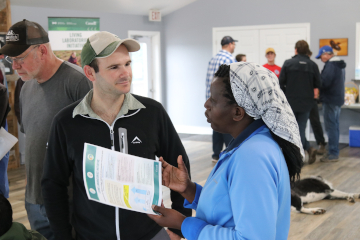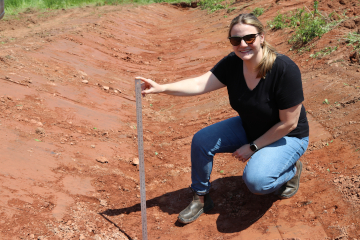
Dr. Nyiraneza and her team actively engage with other living lab participants throughout the project. Learning and networking events encourage dialogue and knowledge exchange.
From 2019 to 2023, Prince Edward Island was home to Living Lab – Atlantic, the first living lab project in Agriculture and Agri-Food Canada’s (AAFC) nationwide network. Each living lab brings together farmers, scientists, and other sector stakeholders to co-develop and test innovative technologies and on-farm practices to reduce our impacts to the environment under real-world conditions. In August 2023, AAFC announced an investment of up to $4.5 million over 5 years under the new Agricultural Climate Solutions (ACS) – Living Labs program for a new project on Prince Edward Island called Living Lab – PEI. Thirteen other living lab projects have been launched across the country since 2022 under the new ACS program.
The East Prince Agri-Environment Association (EPAA), who led the previous living lab, is also the lead for Living Lab – PEI along with AAFC, and 25 other collaborators. The new living lab will continue to promote collaboration to help Prince Edward Island farmers become more sustainable and resilient to climate change and other environmental challenges. While the first living lab focused on developing solutions to improve soil health and water quality, the new Living Lab – PEI, under ACS, focuses on developing solutions to reduce greenhouse gas emissions and store carbon. The intended side-effect of these sustainable practices is that they would also continue to improve soil health, water quality and biodiversity.
Living Lab – PEI focuses on 6 key areas: livestock feeding strategies, rotational grazing, natural carbon sinks, alternative soil amendments, cover crop management strategies, and refining nitrogen management. Among the many AAFC researchers involved in Living Lab – PEI are project co-lead scientists Dr. Judith Nyiraneza and Dr. Audrey Murray.

Dr. Murray’s research technician, Jenn Klaus, measures a mini wetland during construction in Souris, Prince Edward Island. These wetlands, added next to farm fields, will be studied for their ability to store carbon, improve biodiversity and more.
“Living Lab – PEI is the natural progression from our first living lab. We are continuing to explore some of the innovative practices we previously studied like cover crops, reduced tillage and manure applications, but the targets are now on measuring their impact to greenhouse gas emissions,” says Dr. Nyiraneza.
“Farmers are putting importance on sustainable farming practices that are economical and also reduce greenhouse gas emissions. It’s important for us to help farmers make informed decisions on how to achieve this.”
Along with farmers, EPAA, and other collaborators, AAFC will help develop solutions focused on cover cropping, reduced tillage, rotational grazing methods prior to planting potatoes, then assess the greenhouse gas (GHG) emissions. They will also measure the difference in GHG emissions between manure application methods such as injecting it into the soil versus broadcasting the manure on top of soils. Additionally, AAFC scientists will study the effects of biochar, an organic, carbon-rich material made up of organic residues such as plants and wood waste, when added to soils across Prince Edward Island. Other projects include using constructed mini wetlands to improve water quality and capture carbon as well as planting hedgerows in hopes to reduce GHG emissions.
“One of the greatest strengths of living labs to date is the multidisciplinary network that has grown out of this work,” says Emily Belliveau, EPAA’s Knowledge and Technology Transfer Specialist. “Dozens of farmers are collaborating with researchers, governments, and extension specialists to develop on-farm solutions together. Peer-to-peer exchange of ideas is the most direct way to transfer knowledge between producers. Through living labs, we are purposely creating an environment for information exchange.”
Emily added that often, knowledge transfer between producers can identify solutions for longstanding issues and create new areas of interest and exploration that had not been previously considered. As solutions are local and shared through local knowledge-sharing networks, adaptation and application are more responsive to the farmers’ challenges.
“The first living lab laid the groundwork for on-farm collaboration, leading to increased innovation and adoption of environmentally friendly practices like cover crops and enhanced efficiency fertilizers,” says Dr. Nyiraneza.
“We are expecting exciting results to come from Living Lab – PEI for the development and adoption of practices that reduce greenhouse gas emissions.”
If you are a Prince Edward Island farmer interested in participating in the Living Lab – PEI project, have an idea you want to test, or would like to hear more, contact eastprinceassociation@gmail.com.
Learn more about ACS Living Labs
Get more Agri-info
- Want more stories like this? Explore what else Agri-info has to offer.
- Interested in reporting on this story? Contact AAFC Media Relations at aafc.mediarelations-relationsmedias.aac@agr.gc.ca to arrange an interview with one of our experts.